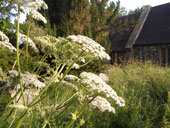ARC featured in Western Daily Press and Bath Chronicle
August 20, 2007:
 |
 |
 |
The article featured the Eco-coffins project... |
The Western Daily Press in the UK featured ARC in a major article on August 13. The Bath Chronicle ran a different article in its Faith to Faith section on August 18. Here is the Western Daily Press Article, which can also be here as a pdf file (2.5MB).
By Susie Weldon
THE setting for ARC - the Alliance of Religions and Conservation - is almost
lofty and idyllic as its aims. Perched high on a hill above Bath and
overlooking the rolling pastures landscaped in 1767 by Capability Brown, the
headquarters for this small organisation with a global influence is in
lovely Kelston Park.
"We are incredibly lucky to be here," says Martin Palmer, ARC's general
secretary, who walks to work over fields with his wife, writer and ARC media
consultant Victoria Finlay.
 |
 |
 |
and the yellow-eared parrot... |
They moved to the area last year but, far from settling into such beautiful
surroundings for the long term, Martin is already looking ahead to the day
when ARC shuts up shop for good - "probably in 2014".
By then, there will no longer be any need for the organisation, which was
founded in 1995 by Prince Philip with the aim of getting religious bodies
and secular environmental groups to work together for the benefit of the
planet.
ARC acts as a bridge between the two worlds. "Our two goals were to get the
religions to work with the environmentalists and the environmentalists to
work with the religions, and that's now happening," says Martin.
"The United Nations has just officially agreed to partner with ARC to
develop a structure to help all the major religions to work on environmental
projects as equal partners. When that happens, there won't be any need for
ARC."
Why is this important?
 |
 |
 |
as well as the Living Churchyards initiative. |
You only have to consider the scale and influence of
the 11 major religions with which ARC works - Baha'i, Buddhism,
Christianity, Daoism, Hinduism, Islam, Jainism, Judaism, Shintoism, Sikhism
and Zoroastrianism
They embrace 85 per cent of the world's population, own eight per cent of
the habitable surface of the planet and if they invested their resources
together, would be the third largest identifiable block of holders of stocks
and shares on the planet. "Religion is not only alive and well, it runs
quite a large part of the world," he says.
Yet the history of relations between faith groups and secular environmental
bodies is one of mutual suspicion, hostility and lack of understanding.
Indeed, secular bodies have generally done all they could NOT to work with
faith groups. "For example, Unesco will not work with religions on any
historical site," says Martin.
"At the moment we broker every major deal between the religious bodies and
secular organisations."
Three years ago, ARC decided to challenge this directly by confronting the
heads of bodies such as the World Bank, the United Nations, the Department
for International Development and USAID.
"We asked them, why will you work with utterly undemocratic bodies or
corrupt governments yet you won't work with religious groups?" says Martin.
The outcome of such lobbying is the UN agreement, but ARC would not have
succeeded if it had not already demonstrated how powerful such an alliance
could be.
And an indication of how influential ARC has become is Martin's appointment
as a special advisor to the UN Secretary General on climate change, the
environment and the faiths. He will be one of a panel of 25 special
advisors, who take up their post from September.
ARC's origins go back to 1986 when Prince Philip, as patron of the global
conservation body WWF, was concerned that the message about the
environmental crises facing the world was not getting through to people.
He thought one way might be to look at what people actually believed so he
invited leaders of five world maor religions - Buddhism, Christianity,
Hinduism, Islam and Judaism - to discuss how their faiths could help save
the world.
From this beginning grew the seeds of ARC and now around 150,000
religion-based environmental projects have begun worldwide. Today ARC works
on a huge variety of projects, from protecting the yellow-eared parrot in
Colombia to helping South Africans develop eco-coffins.
What it does not do is seek a consensus among religions. "We are not an
interfaith group and our concern is not to find common ground," Martin
explains.
"Our concern is to say, 'here is an issue - climate change, habitat loss,
sustainable housing and so on; what in your tradition have you got that
contributes to this?'
"Because what's distinctive about the faiths is what is different. So we're
interested in difference and we celebrate diversity."
One reason for getting the faiths involved in protecting the environment is
that they focus on the long term.
"The religions take a very long time to move, but when they do, it's
forever," says Martin. "They work in generations rather than 18-month
campaigns; they're the oldest institutions in the world."
An example of this is the Church of England's Living Churchyards project.
Martin explains: "One tenth of England is owned by the Church Commissioners.
"We began a programme to look at churchyards because they're often old
meadows that have never been sprayed, so they're the last remaining eco
systems where beetles and insects and bats are found.
"We now have more than 6,500 churchyards under ecological management.
"We started talking about it in 1987 and it took us until 1997 for the
churchwarden's handbook to have a section on ecological management. Now it
will be there forever."
But if Martin is eagerly looking forward to the time when ARC is no longer
needed, right now he is simply delighted to be back in the Bristol and Bath
area, which marks something of a homecoming for him. He spent 10 years of
his childhood in one of Bristol's poorest estates, Hartcliffe, where his
father was vicar.
Working for ARC has been a wonderful way of bringing his two passions - his
faith and his love of the natural world - together, says Martin, who is a
regular contributor to Radio 4's Thought For The Day.
"I'm a Christian and I love my faith, warts and all. Sometimes it drives me
around the bend and sometime it's the only thing that keeps me going, so I
know the power of faith," he says.
"I wanted religion to be taken seriously and I wanted to keep the world
beautiful. I celebrate a pluralist world where all religions have a place
alongside every other group that has a view."
COPYRIGHT WESTERN DAILY PRESS
Linkhere to see the article as a pdf file (2.5MB).
|

